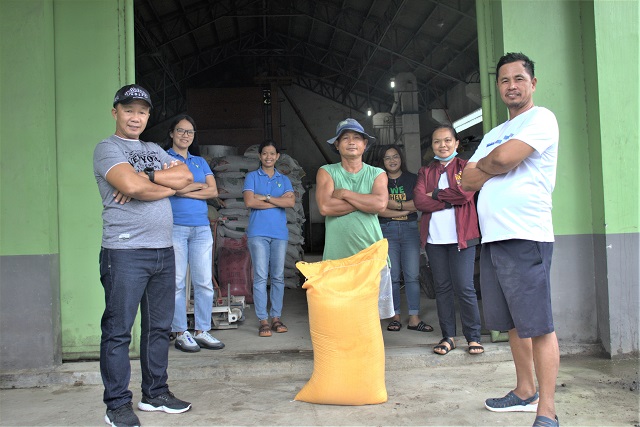
There is strength in togetherness. This line proves true in the journey toward success of Balangibang Palayamanan Farmers Incorporated (BPFI).
When consecutive setbacks confronted them, members of this farmers’ association in Polangui, Albay dared to find opportunities in the midst of difficulties.
It started with hunger to learn
BPFI members started from participating in a farmer field school in 2010.
“We started as a group of farmers who wanted to learn about new technologies that we can use to increase our farm produce,” Bayani Abarquez, BPFI treasurer, narrated.
Learning that they can benefit from more government interventions as a group, they worked together until their association was registered with the Department of Labor and Employment in 2012 and the Securities and Exchange Commission in 2018.
“Starting in 2013, assistance from the government kept pouring in. We received several farming equipment year after year until our rice processing center was completed,” Abarquez recounted.
When an opportunity to learn more through the RiceBIS Program of DA-PhilRice was offered to them in 2018, they did not hesitate to grab it.
“This group is really open to new ideas,” Shiela Sabaria, RiceBIS implementer, noticed.
She remembered that when the RiceBIS team in PhilRice Bicol started working with them, members of the association were already knowledgeable in rice production but needed guidance in entrepreneurship.
Abarquez said that even before RiceBIS, they were selling some farm inputs such as fertilizers and pesticides, milled rice, and were offering custom services using their tractors, harvesters, and other farm equipment but they relied on walk-in customers alone.
“We were making about P250,000 a year then. After RiceBIS, we started to make millions as we learned to communicate with institutional buyers,” he disclosed.
Opportunities amid challenges
“It was difficult for us at first when the pandemic and destructive typhoons hit Bicol Region but as local government units (LGUs), foundations, and different groups looked for rice supply to be distributed during their relief operations, we saw an opportunity to market our products and help respond to the needs of our countrymen,” Abarquez recalled.
He shared that the association, with the rice produce of its 41 members and 149 associate members, was able to supply rice to LGUs in Bicol, several foundations, including the nearby office of Vice President Leni Robredo. This brought them sales amounting to P3M.
“Sometimes our own produce is not enough to supply the demand of our buyers. The good thing is we partner with other associations so we can help each other. If we have supply shortage, other associations fill in the gap. If our rice miller cannot process all our rice produce, we run to other rice processing centers,” he said.
He added that when palay price dropped to P10, they bought the produce of farmers who are not members of the association at P13 up. This still brings profit to the other farmers, said Abarquez, because the cost of per kilo production in Bicol is projected at P11 to P12.
Grabbing these opportunities elevated their association’s income from P2.3M in 2019 to P7.5M in 2020.
“Choosing BPFI to be part of the RiceBIS Program was a good decision because it became a helping hand to the smaller clusters,” Sabaria said.
With its worth P13.3M assets, BPFI lends its farm equipment and helps in the marketing of the products of smaller and younger associations in the area.
Advantages of clustering
“Group marketing is a huge help to individual farmers because they can command a higher price for their produce,” Sabaria explained.
“Before, we rushed to sell our palay to traders after harvest. Now, we have storage and milling facilities so we can mill, store our rice produce, and later sell at a higher price,” Abarquez confirmed.
He said that members who have immediate cash needs can borrow from the association.
Moreover, with their group’s experience, he saw how important unity is for farmers’ groups to succeed. Assistance from the government is also a huge factor, according to him.
Sabaria also observed that the group does not anymore depend too much on government assistance, and they make full use of the help that the government gives them.
Toward more success
Abarquez pointed out that there is still a need to improve on what they already have because as their market is growing, demand is rising, and competition is becoming tight.
“Our goal now is to obtain a better rice milling machine because what we have can only produce regular-milled rice. Some institutional buyers want well-milled rice,” he said.
The association is also looking forward to adding brown rice to their agroenterprise as the demand for this kind of rice is increasing in the area.
“With this, we will be able to better our situation and help more farmers in our locality,” he emphasized.
Indeed, there is no better sight during challenging times than to see people help and uplift each other toward success. Fortunately for farmers in Balangibang, they have a progressive association to count on.




